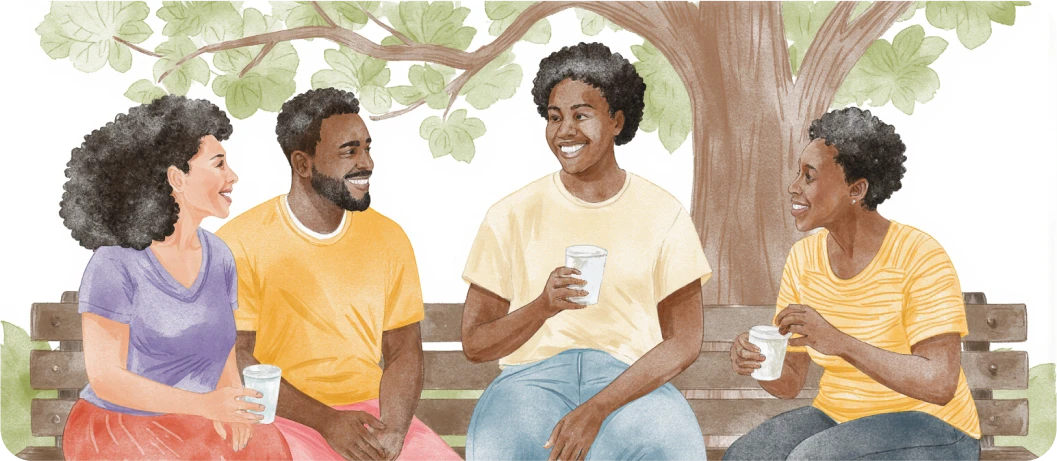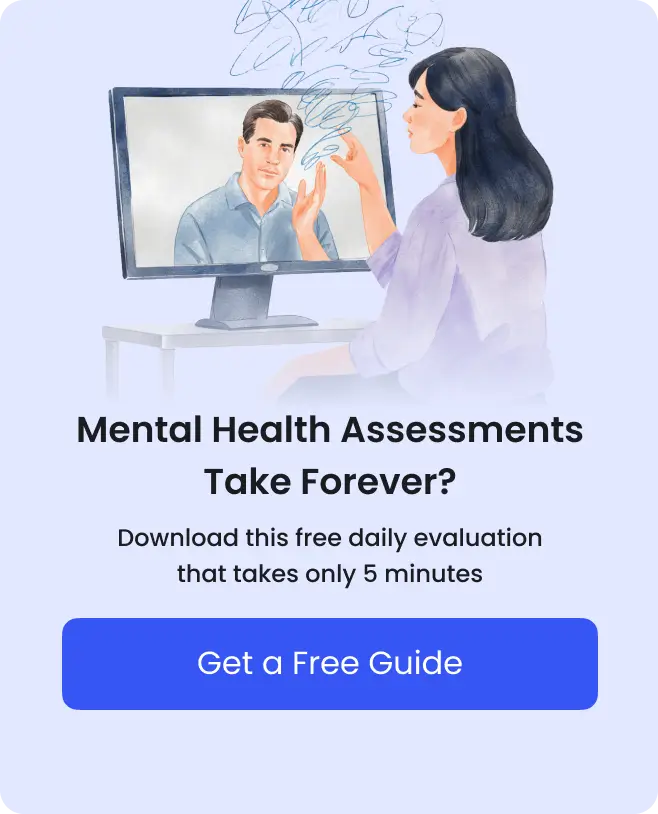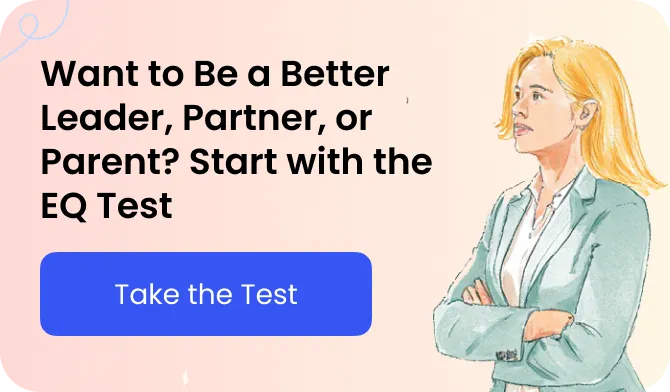Making friends as an adult can feel challenging, especially if you’re busy with work, family, and other responsibilities. It may be hard to find time for creating connections. However, it is often worth the effort—the American Psychological Association revealed that people who have solid friendships are happier than those who don’t have friends.
So, if you’re wondering how to make friends as an adult, here are effective strategies to find new relationships and form meaningful friendships.
Why Is It So Hard to Make Friends as an Adult?
Starting new friendships as an adult can feel intimidating or awkward, especially if you’re not used to meeting new people. When you’re in school or college, you’re surrounded by people all the time, and friendship may often happen organically.
As an adult, though, it may not be as common to be around social groups who are in the same situation in life as you, so you have to actively seek out opportunities to meet people and sometimes overcome covert avoidance.
Moreover, according to research, as many adults get older, they may have established social circles and prioritize spending time with old friends and people who know them well, and therefore, whittle their connections down.
This is where the Breeze app can help. Take the “What are my values?” quiz and many other personality, relationships, and career tests to understand yourself better and discover the types of people you’re most likely to connect with.
11 Effective Ways for Making Friends as an Adult
The recent research found that spending time with friends can boost your happiness, and the importance of adult friendship to happiness increases with age. Here are 11 practical ways to meet new people as an adult:
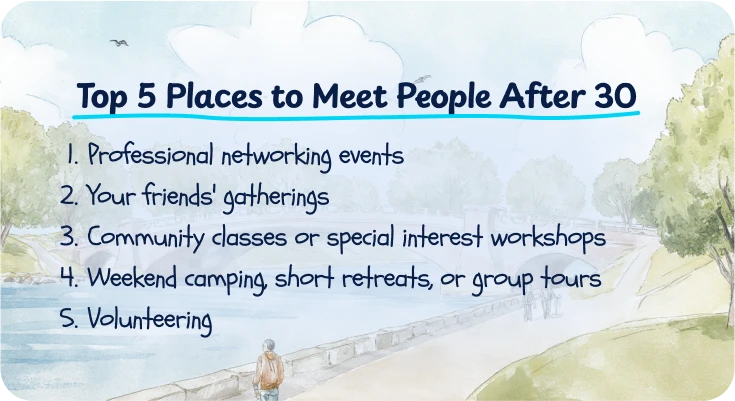
1. Take a Closer Look at the People Around You
Maybe you’ve been wanting to chat with one of your colleagues for a long time? You can make a list of people whom you see as potential friends and invite them one by one for a chat over a cup of coffee. Here’s how to make it happen organically:
- You may text them, beginning the conversation with a friendly and non-intrusive question. For example, “Hi! I was really impressed by your project. Would you like to grab a snack sometime and tell me more about it?” Or, show them you have shared interests: “I noticed in the chat that you’re into photography. Mind giving me a quick lesson?”
- Company networking events offer great opportunities to make new connections. If you’re nervous about speaking with a new person, you can prepare a few conversation topics in advance.
Another idea for finding friends may be connecting with a neighbor or someone in your local group. You could invite them for a walk in the park or a quick chat over tea, saying: “Hi! I’ve seen you around and wanted to introduce myself. I love your gardening work in the yard! Any tips for a beginner?”
If you are wondering whether you’re a good friend or want to improve your emotional intelligence in the workplace, take a simple and informative emotional intelligence test!
2. Meet Your Friends’ Friends
In this case, the saying “Tell me who your friends are, and I’ll tell you who you are” may hold true. Your friends tend to surround themselves with like-minded people who share similar interests and values. So, you can find out whether their friends are just as interesting, fun, and awesome as they are.
For example, accept invitations from your friend to a gathering or a night out and join in. You might not only enjoy spending time with your friend but also meet new friends.
You can also suggest to your friend, “I’d love to meet your friends again. Maybe we could all grab a coffee or go to a running club or book club together sometime.” You never know, one of their great friends could have common interests and become one of your lasting friendships.
Whether you’re outgoing or more on the shy side, knowing how likable you are can help boost your charisma and help you form adult friendships.
3. Go Study
Even if school and university are behind you, you can still experience student life as a natural way of cultivating friendships as an adult. Courses in a foreign language you have always wanted to learn, such as creative writing, painting, programming, or cooking classes, are all opportunities to meet friends through self-improvement or simply doing something you enjoy. Even participating in more casual classes, such as monthly art classes or community-offered events, could present new opportunities to meet approachable people.
Tip
For the best experience, opt for long or repetitive, in-person courses to have enough time to get to know people, whether by chatting during breaks, grabbing a coffee together, or walking home after class. This way, you are more likely to find your best friends.
4. Try a Team Extreme Experience
Try hiking, rafting, conquering a mountain peak, or going on a weekend camping trip. Your choice depends on your preferences and love of extreme sports. Moments like these are really helpful in making friends as an adult, as they may show you who’s easy to rely on and can potentially become your best friend. Sharing unique experiences can also pave the way for easy conversation and relating to one another.
According to scientists from Cornell University and the University of Pittsburgh, shared extraordinary experiences bring people closer. That’s why such an adventurous trip, with its mix of emotions and memories, may become a foundation for deeper connections.
5. Attend Networking or Social Events
These gatherings are made specifically for making connections with people in a casual environment, with small talks and group games. Even if you’re a little shy and may think, “What is wrong with me in social situations?”, you’ll have lots of opportunity to chat with new people, because activities like these make it easier to start a conversation.
Do you feel anxious in social settings?
6. Use “The Strength of Weak Ties”
“The strength of weak ties” is a concept introduced by sociologist Mark Granovetter. The main idea is that people you don’t know that well can actually be valuable when it comes to making friends as an adult.
Here’s how Granovetter saw it:
- Strong ties are your close friends or family members whom you talk to all the time and know well. You usually share the same social circle.
- Weak ties are people you don’t hang out with often, like some childhood friendships, college friends you don’t interact with much, or a friend’s friend.
So, weak ties can help you expand your network, meet new friends with shared interests, and discover things you wouldn’t otherwise.
7. Try Volunteering
When you volunteer, you’re usually around people who share your core values, which can connect you and inspire you to be the best version of yourself. Whether you’re helping at a food bank, cleaning up a park, or playing with kids in a local community center, you’re working together toward a shared goal, and that can form common ground and make you closer.
8. Take A Solo Trip
As reported by The Guardian, Google searches for solo travel have quadrupled since 2020. At the same time, when you travel alone, you’re more likely to step outside your comfort zone and be open to new experiences. It, in turn, increases the chances of making friends as an adult.
When preparing for your trip, use social media and travel apps. For example, on Couchsurfing, you can stay with locals, who may show you around or introduce you to their friends. Another app, Meetup, allows you to find events or groups in a new city where you can join activities and also meet new friends.
At the same time, many hostels, guesthouses, or shared Airbnb spaces organize events, like happy hours, tours, or communal meals. Here you can meet people all over the world and make friends.
If you’re working while traveling in a co-working space, you can find new friendships among other solo travelers or digital nomads who are often eager to socialize, network, and share experiences.
9. Go to Open Mic Nights, Comedy Shows, or Improv Class
If you’re into live performances, going to open mic nights or comedy shows allows you to make new friends in a relaxed and fun atmosphere. There, you can share a laugh or start a conversation with other audience members who enjoy the same jokes or acts to find adult friendships.
One of the best advice is also to join an improv class as a fun way to step out of your comfort zone while meeting new friends.
10. Become a “Regular” at a Coffee Shop
When you visit the same spot often, you might start to recognize the staff and other frequent customers. Small interactions like chatting with the barista or bumping into the same people during brunch can lead to meaningful connections over time.
11. Take Part in Local Politics or Civic Organizations
If you’re wondering how to change your life and feel more like part of the local humane society, try to join a political campaign or civic organization. When you run social media groups, help organize meetings, or attend social events, you may meet like-minded people who share a passion for creating positive change. As a result, you may form strong adult friendships based on common interests.
Apps for Making Friends
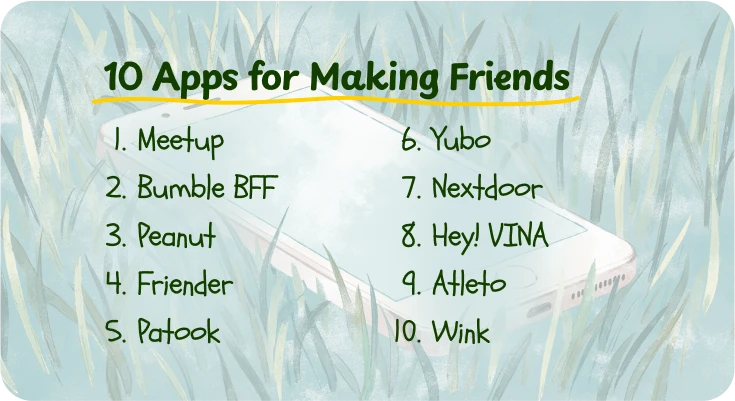
Wondering how to make friends as an adult if you work remotely and don’t have an active social life? Here’s a list of apps for building friendships, so you can choose which fits your style and goals:
- Meetup for local events and interest groups.
- Bumble BFF is a “friendship mode” of Bumble where you swipe to match with potential friends instead of dates.
- Peanut is designed for women, especially mothers, to connect over shared experiences and support.
- Friender matches you with people who share at least one common interest to help start a conversation.
- Patook focuses on platonic friendships, using a points-based system to encourage kind and respectful chats.
- Yubo is a social discovery app for younger audiences that mixes livestreaming with friend-finding.
- Nextdoor helps you connect with people in your neighborhood for both initiating friendships and local activities.
- Hey! VINA is known as “Tinder for (girl) friends”.
- Atleto is perfect if you want workout buddies.
- Wink is a friendship-focused app that works a bit like Snapchat meets Tinder, but for finding several friends instead of dating.
In addition to apps, you can try joining your local group on Facebook focused on hobbies, community activities like a book club or sports team, or specific life stages.
The Breeze app can guide you in setting social goals using customized routine plans and build the confidence to start conversations.
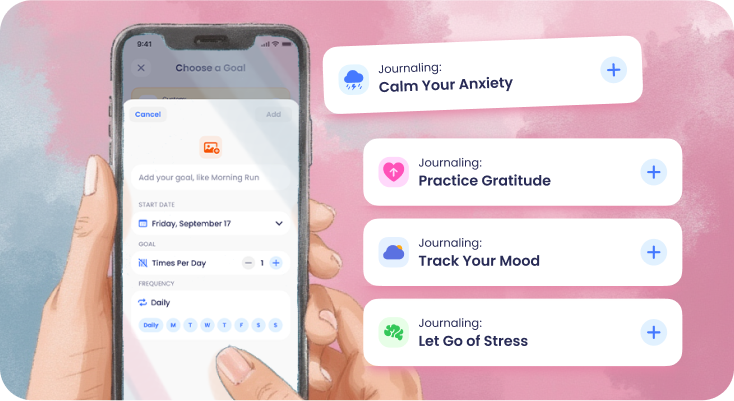
FAQ: How to Make Friends As an Adult
Frequently asked questions
1. Is it too late to make friends as an adult?
“Just as we never outgrow our need for play, we never outgrow the capacity to form new connections! We as humans are social creatures by habit; it’s just about conquering the art of finding social routines that present novel opportunities to meet new people. Friendships give us a sense of community, something that comes in very handy when we hit bumps in the road. It’s our job to cultivate new opportunities for relationships, as we tend to outgrow learned ways of connecting as life moves forward” – Katherine Scott, M.Ed/Ed.S, LMFT.
2. At what age is it hardest to make friends?
In short, after the age of 25 it’s getting harder to make new friends. According to a study published, men and women tend to make more friends and social connections until they reach the age of 25. After that, they start losing friends more quickly, with women losing old friends faster than men at first. On average, a 25-year-old woman stays in touch with about 17.5 people per month, while a man contacts 19 people.
3. Is it normal to have zero friends?
Yes, it’s totally normal to go through times in adult life where you feel like you don’t have any friends. It can happen for a lot of reasons. Maybe you’ve moved to a new city, your interests have changed, or life has gotten busy with work or romantic relationships. However, if the isolation starts affecting your mood, self-esteem, or overall well-being, that’s when it’s worth reaching out and reconnecting with others.
4. Is it normal to lose friends as an adult?
“Absolutely, and it does not have to be a negative thing! As we grow, we evolve into different versions of ourselves. As we self-actualize, our friend group has a natural way of shifting, shedding, and evolving. It’s OK for a friendship to feel extremely close during one chapter of your life and then completely distant during the next. People evolve at different rates and down different paths, it’s as natural as the change of the seasons” – Katherine Scott, M.Ed/Ed.S, LMFT.
Sources
- Zara Abrams. The science of why friendships keep us healthy. June 2023.
- Song I, Kwon JW, Jeon SM. The relative importance of friendship to happiness increases with age. July 2023.
- Kate Min, Peggy J Liu, Soo Kim. Sharing Extraordinary Experiences Fosters Feelings of Closeness. January 2018.
- StanfordReport. The strength of weak ties. July 2023.
- Phoebe Taplin. ‘It’s all about stepping out of your comfort zone’: 10 tips for solo travellers. January 2023.
- Laura Delarato. Why travelling alone is the best impulse decision I ever made. November 2017.
- Molly Gorman. Why later life can be a golden age for friendship. December 2024.
- Meera Senthilingam. This is the age when you start losing friends. June 2016.
Disclaimer
This article is for general informative and self-discovery purposes only. It should not replace expert guidance from professionals.
Any action you take in response to the information in this article, whether directly or indirectly, is solely your responsibility and is done at your own risk. Breeze content team and its mental health experts disclaim any liability, loss, or risk, personal, professional, or otherwise, which may result from the use and/or application of any content.
Always consult your doctor or other certified health practitioner with any medical questions or concerns
Breeze articles exclusively cite trusted sources, such as academic research institutions and medical associations, including research and studies from PubMed, ResearchGate, or similar databases. Examine our subject-matter editors and editorial process to see how we verify facts and maintain the accuracy, reliability, and trustworthiness of our material.
Was this article helpful?
